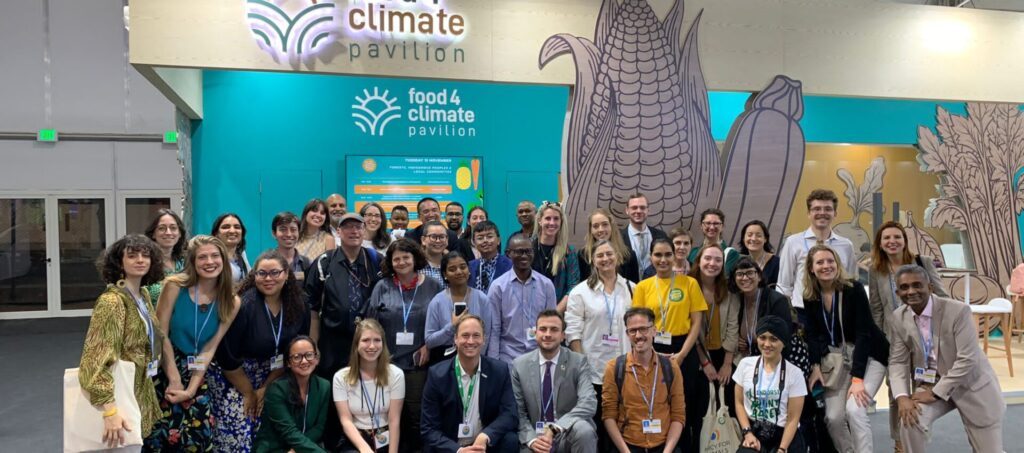COP28: UN Climate Summit Confirms Two-Thirds of Food Will Be Meatless This Year
5 Mins Read
Months after confirming that this year’s UN climate summit will have a “mostly vegan” menu, the COP28 Presidency has announced that two-thirds of the 250,000 meals served daily will be vegan and vegetarian. The move comes as experts describe the Dubai-hosted event as the first food-focused COP.
The COP28 catering team has confirmed that two-thirds of all food at the summit will be plant-based or vegetarian, in a menu described as “1.5°C aligned”. It comes after an open letter and months of campaigning by the Youth and Children Constituency of the UNFCCC (YOUNGO) and over 140 youth and civil society groups led to UAE’s COP28 President-Designate Dr Sultan Al Jaber guaranteeing that the conference will have a plant-forward menu.
Besides the high amount of meat-free food, the Sustainable Catering Strategy at COP28 will centre on inclusivity, waste, packaging, emissions labelling and carbon budgets. Last year’s annual summit in Egypt hosted its first-ever pavilions dedicated to food system changes, and Glasgow’s COP26 in 2021 added climate levels to the meat-heavy food menu but failed to add food and livestock farming to the agenda.
Climate activists win the fight for sustainable catering

The impact of livestock farming has been increasingly under the spotlight recently, given multiple studies that show how replacing half of our meat and dairy intake with plant-based alternatives can double climate benefits, and veganism can cut emissions, land use and water pollution by 75% compared to meat-rich diets. And a recent investigation into the UN FAO’s censoring of the link between animal agriculture and climate change due to lobbying pressure has amplified the scrutiny.
YOUNGO’s Food@COP initiative, which aims to ensure that the UN’s annual climate summit has climate-friendly catering, was supported by sustainable food advocacy organisation ProVeg International in its efforts. Its open letter from April, which also demanded locally sourced (where possible) and culturally inclusive food, read: “Progress on climate-friendly catering has already been made at previous COPs and major climate events in Bonn, Glasgow, and Stockholm. Yet, despite persistent demands from attendees, especially youth, the food on offer at these events has been out of step with the climate emergency.”
In response, Al Jaber said: “The COP28 Presidency has a firm focus on transformational action on food systems within the wider global climate change agenda. As part of this, we intend to demonstrate sustainable food systems in action at COP28 itself. My team has been working to ensure the availability of plant-based food options that are affordable, nutritious, and locally and regionally sourced, with clear emissions labelling.”
“The Catering Letter Steering Committee has worked very hard with the COP28 Presidency to ensure that the food is predominantly plant-based at this all-important summit,” said ProVeg campaigns and policy officer Lana Weidgenant. “By committing to plant-rich, affordable catering, the COP28 Presidency is showing leadership and acknowledging the impact of diets high in animal-sourced foods. It is really fantastic to see this happening.”
Gloria Agyare, a member of Food@COP and the YOUNGO Food and Agriculture Working Group, added: “In this moment, hearing young voices and seeing their ideas come to life fills me with immense joy. As a young advocate from the Global South, it gives me great hope that youth are playing a vital role in shaping our future. I can’t wait to taste the food, knowing it’s a delicious symbol of our dedication to a climate-friendly tomorrow.”
COP28 Presidency’s problems

An estimated 250,000 meals are expected to be served to over 60,000 visitors daily across nearly 80 outlets at COP28, which include food halls, grab-and-go stations and food trucks. Making two-thirds of it vegan and vegetarian is “excellent progress”, as Raphaël Podselver, director of UN Affairs at food advocacy non-profit ProVeg International, said last month.
His statement came after it emerged that this year’s conference will have an increased focus on food systems. COP28 – to be held from November 30 to December 12 – will spotlight food with policy announcements, a food pavilion, and a dedicated Food, Agriculture and Water Day on December 10. Podselver said it’s the “first time we are having real discussions on food and agriculture at a COP summit”, and is expecting policy shifts to advance plant-rich diets and protein diversification, improve food security and reduce agrifood emissions.
Additionally, the COP28 Presidency is also calling on governments to sign a Leaders Declaration on Food Systems, Agriculture and Climate Action and incorporate food systems and agriculture into national climate agendas.
However, the Presidency itself has some issues to contend with. According to the Guardian, the UAE has the world’s third-largest net-zero-busting plans for oil and gas expansion, and its new fossil fuel developments are incompatible with the 2050 net-zero goals. Additionally, the global organisation Climate Action Tracker rates the UAE’s environmental plans as “insufficient”.
Moreover, Al Jaber is the CEO of Adnoc, the UAE national oil company. A leaked document has revealed that the firm hasn’t disclosed its emissions or published a sustainability report since 2016, though it adds that the company is “currently conducting necessary studies”. “Climate ambition” is another issue listed, with the UAE increasing its pledges’ ambition recently. But even then, its pledge would allow the country’s carbon emissions to increase until 2030.
This is why Podselver pointed out that on a global scale, there’s still work to do to raise awareness among UN nations about food’s impact on the climate, and solutions to cut emissions. But nevertheless, he hailed the decision to reduce meat from the world’s preeminent climate policy event. “We expect to see plant-based catering as well as emissions labelling on food embraced by other summits going forward. We certainly do not see this as a one-off, but rather another stage in a journey towards raising awareness of how to make our diets more climate-friendly.”




